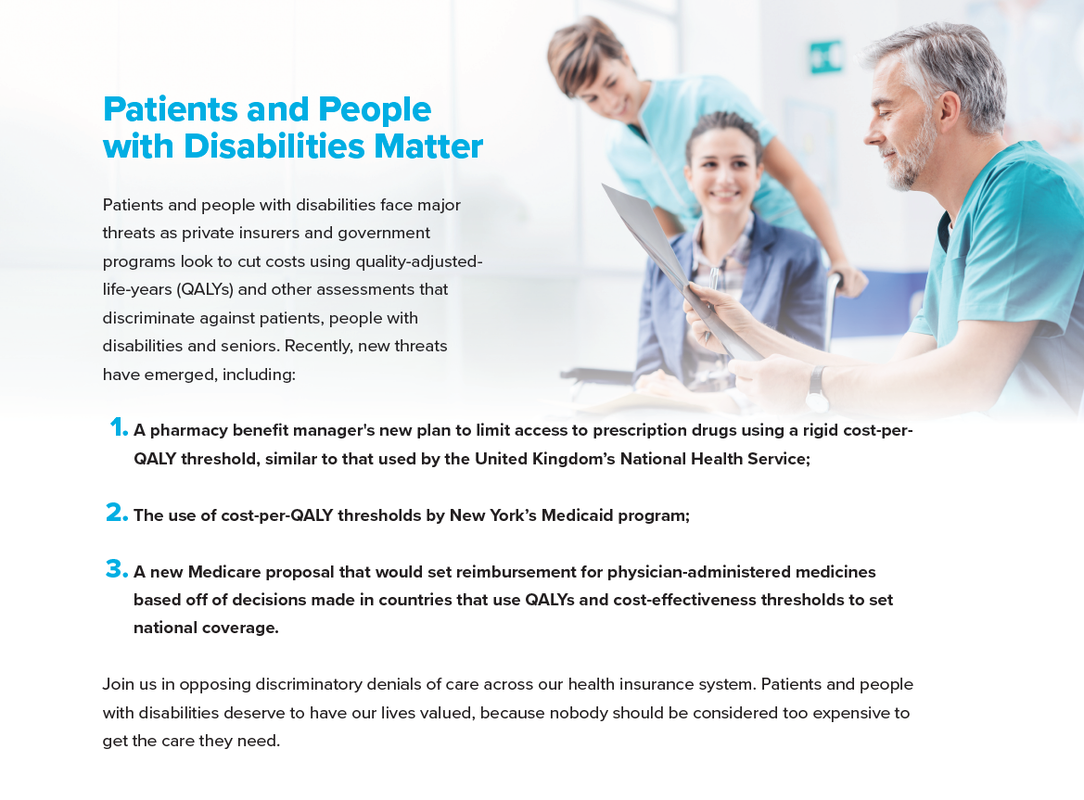
Patients and people with disabilities face major threats as private insurers and government programs look to cut costs using quality-adjusted-life-years (QALY) and other assessments that discriminate against patients, people with disabilities, and seniors. Recently, new threats have emerged, including: (1) a pharmacy benefit manager's new plan to limit access to prescription drugs using a rigid cost-per-QALY threshold, similar to that used by the United Kingdom's National Health Service; (2) the use of cost-per-QALY thresholds by New York's Medicaid program; and (3) a new Medicare proposal that would set reimbursement for physicial-administrated medicines based off decisions made in countries that use QALYs and cost-effectiveness thresholds to set national coverage. Join us in opposing discriminatory denials of care across our health insurance system. Patients and people with disabilities deserve to have our lives valued, because nobody should be considered too expensive to get the care they need.
-
“It’s devastating to not even be able to try a drug that could work for you… I understand a line has to be drawn but it feels unfair that other people make decisions about your life and how much it's worth.”
- Patient with breast cancer in the U.K.
-
“It’s incredibly cruel to use the cost-effectiveness line and it makes me shake with rage…It’s like being in a dystopian society – it has been approved in Scotland and the US and Europe but England is just lagging so far behind… It’s an abomination of human rights that the drug isn’t available. It feels like discrimination against his disability.”
- Parent of child with SMA in the U.K.
-
"There's no way I can't try this drug. It's the last thing that might save my life… It's crazy that I live in Canada, but now I'm looking at having to sell my house for coverage of my medication."
- Patient with breast cancer in Canada
-
"'If they do approve it in September, she could be too far gone and then we’d be told it’s not worth the NHS’s resources."
- Parent of child with Batten’s disease in the U.K.
What Happens in Countries Using QALYs and Cost-Based Thresholds to Determine CoverageOther countries are often referenced as examples of how the use of QALYs or similar cost-based thresholds impact access to care:
|
|
Case Studies
German Health System & Its Impact on Patient AccessThough the German system does not rely on the QALY, the flawed process by which they determine a treatment’s clinical benefits has significant implications for access to care.
|
NCD Highlights Impact of QALYs on Disability CommunityAs detailed in a report from the National Council on Disability, the use of QALYs continuously devalues the lives of people with disabilities by creating unnecessary barriers to access.
|
Congress Moves to Import Discriminatory Health Policies"If we as a nation want to have a serious and nuanced discussion about getting to a fair and equitable health system, we must reject reliance on QALYs and other discriminatory metrics and embrace PCORI as part of the solution."
|
Letter on Proposed International Pricing IndexPIPC's letter highlights concerns that this new policy would import QALY-based standards to key U.S. health programs
NCD Letter on 'Most Favored Nations Rule'NCD's letter to CMS outlines serious concerns about the impact of the Most Favored Nations rule on the disability community.
|
Chairman Coelho in San Jose Mercury NewsPIPC Chairman Tony Coehlo penned an op-ed in The Mercury News outlining his concerns with the Trump administration’s proposed international drug pricing index.
PIPC Applauds NCD Efforts to Combat Health Discrimination"We believe that more work needs to be done to provide a full picture and understanding of the inherent bias of discriminatory metrics used in health care decision-making."
|
60 Groups Oppose HHS 'Most Favored Nations' Rule60 leading groups and individuals representing the patient and disability communities signed onto PIPC's comment letter to HHS opposing the Trump administration's Most Favored Nations rule.
NCD Statement on International Pricing Index“Making prescription medicines more affordable is a proper and necessary goal for the U.S., but it is not in the best interest of Americans to import price controls from countries that use the IPI to determine U.S. drug pricing.”
|









